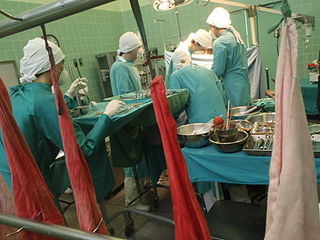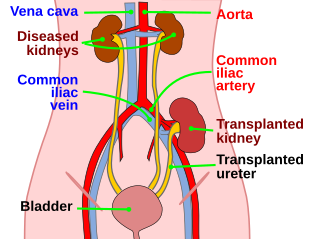Related Research Articles

Organ donation is the process when a person allows an organ of their own to be removed and transplanted to another person, legally, either by consent while the donor is alive or dead with the assent of the next of kin.

Organ transplantation is a medical procedure in which an organ is removed from one body and placed in the body of a recipient, to replace a damaged or missing organ. The donor and recipient may be at the same location, or organs may be transported from a donor site to another location. Organs and/or tissues that are transplanted within the same person's body are called autografts. Transplants that are recently performed between two subjects of the same species are called allografts. Allografts can either be from a living or cadaveric source.
The Uniform Anatomical Gift Act (UAGA), and its periodic revisions, is one of the Uniform Acts drafted by the National Conference of Commissioners on Uniform State Laws (NCCUSL), also known as the Uniform Law Commission (ULC), in the United States with the intention of harmonizing state laws between the states.

Kidney transplantation or renal transplantation is the organ transplant of a kidney into a patient with end-stage kidney disease. Kidney transplantation is typically classified as deceased-donor or living-donor transplantation depending on the source of the donor organ.

Body donation, anatomical donation, or body bequest is the donation of a whole body after death for research and education. Donated bodies are mostly used for medical education and research. They are used for gross anatomy, surgical anatomy and for furthering medical education. For years, only medical schools accepted bodies for donation, but now private programs also accept donors. Depending on the program's need for body donation, some programs accept donors with different specifications.
NHS Blood and Transplant is an executive non-departmental public body of the United Kingdom's Department of Health and Social Care. It was established on 1 October 2005 to take over the responsibilities of two separate NHS agencies: UK Transplant, founded by Dr. Geoffrey Tovey in 1972, and the National Blood Service. Its remit is to provide a reliable, efficient supply of blood, organs and associated services to the NHS. Since NHSBT was established, the organisation has maintained or improved the quality of the services delivered to patients, stabilised the rising cost of blood, and centralised a number of corporate services.
A tissue bank is an establishment that collects and recovers human cadaver tissue for the purposes of medical research, education, and allograft transplantation. A tissue bank may also refer to a location where biomedical tissue is stored under cryogenic conditions, and is generally used in a more clinical sense.
On October 19, 1984, the Congress of the United States approved the National Organ Transplant Act (NOTA). It not only established the framework for the U.S. organ transplant system but has served as a model for development of other transplant networks worldwide. Through the establishment of a national Organ Procurement and Transplantation Network (OPTN), the law directed that organ allocation would be managed on a national basis and be developed through a unique public-private partnership. Since the initial network contract was finalized in 1986, United Network for Organ Sharing (UNOS) has served as the OPTN under contract with the U.S. Department of Health and Human Services. OPTN policies are developed by a broad community that includes donation and transplant clinicians and professionals, as well as people personally touched by the donation and transplant experience. NOTA and subsequent federal regulation call on the OPTN to emphasize fair and equitable patient access to transplantation, as well as reliance on objective medical evidence and adaptability to rapid evolution in clinical treatment and scientific understanding. Many of the OPTN’s responsibilities, priorities and policies have changed over the years. Yet the lifesaving gift organ donation, and the continuing need of candidates awaiting a transplant, remain the same today as they did 30 years ago. To fulfill the ultimate goals of NOTA, we must continue to ensure that the national transplant network allocates organs efficiently and fairly. We must also build public knowledge and trust in organ donation to help increase transplant opportunities for everyone in need.

Donate Life America (DLA) is a 501(c)(3) nonprofit organization leading its national partners and Donate Life State Teams to increase the number of donated organs, eyes and tissues available to save and heal lives through transplantation while developing a culture where donation is embraced as a fundamental human responsibility.
Organ trade is the trading of human organs, tissues, or other body products, usually for transplantation. According to the World Health Organization (WHO), organ trade is a commercial transplantation where there is a profit, or transplantations that occurs outside of national medical systems. There is a global need or demand for healthy body parts for transplantation, which exceeds the numbers available.
In December 2006, The UK Government set up the Organ Donation Taskforce to identify barriers to organ donation and recommend actions needed to increase organ donation and procurement within the current legal framework.

The Human Tissue Act 2004 is an act of the UK parliament applying to England, Northern Ireland and Wales. It consolidates previous legislation and created the Human Tissue Authority to "regulate the removal, storage, use and disposal of human bodies, organs and tissue."
The Ontario Online Donor Registry is a website where Ontario residents, age 16 and older, can register their consent to be an organ and tissue donor. This registry was created to help ease questions and ambiguities with organ donor wishes. The virtual registry also increases Ontario donations with increased accessibility. The registration process can be done through beadonor.ca. Online donor registries have also become popular in the United States, where one can register through Donate Life America; Malaysia, registering through their National Transplant Registry; and Saudi Arabia, registering through the Saudi Center for Organ Transplantation.

The Human Transplantation (Wales) Act 2013 is an act of the National Assembly for Wales, passed in July 2013. It permits an opt-out system of organ donation, known as presumed consent, or deemed concent. The act allows hospitals to presume that people aged 18 or over, who have been resident in Wales for over 12 months, want to donate their organs at their death, unless they have objected specifically. The act varies the Law of England and Wales in Wales, which relied on an opt-in system; whereby only those who have signed the NHS organ donation register, or whose families agreed, were considered to have consented to be organ donors.

MOHAN Foundation is a not-for-profit, registered non-government charity organisation in India that works in the field of deceased organ donation and transplantation. MOHAN is an acronym for Multi Organ Harvesting Aid Network. It has offices in Chennai, Hyderabad, Bengaluru, Delhi, Mumbai, Chandigarh, Nagpur, Jaipur and information centers at Kerala and Imphal.
Transplant Coordinator is a healthcare professional – doctor, nurse, or allied health science graduate who coordinates activities related to organ donation and transplantation. Transplant coordinators can either be Donor Coordinators or Recipient Coordinators.
Organ donation is when a person gives their organs after they die to someone in need of new organs. Transplantation is the process of transplanting the organs donated into another person. This process extends the life expectancy of a person suffering from organ failure. Unfortunately the number of patients requiring organ transplants outweighs the number of donor organs available.
BC Transplant Society (BCTS) founded in 1985 is now an agency of Provincial Health Services Authority (PHSA) in the Canadian province of British Columbia that registers consent to be donors of organs for Organ transplantation.
Organ transplantation in the Indian state of Tamil Nadu is regulated by India's Transplantation of Human Organs Act, 1994 and is facilitated by the Transplant Authority of Tamil Nadu (TRANSTAN) of the Government of Tamil Nadu and several NGOs. Tamil Nadu ranks first in India in deceased organ donation rate at 1.8 per million population, which is seven times higher than the national average.
Organ donation in India is regulated by the Transplantation of Human Organs and Tissues Act, 1994. The law allows both deceased and living donors to donate their organs. It also identifies brain death as a form of death. The National Organ and Tissue Transplant Organisation (NOTTO) functions as the apex body for activities of relating to procurement, allotment and distribution of organs in the country.
References
- Australian Organ Donor Register (official website)
- Australian Social Trends 2002: Health - Health Related Actions: Organ donation [ permanent dead link ] by the Australian Bureau of Statistics
- ↑ "Organ donor option on a driver's licence". SA.GOV.AU. Retrieved 26 February 2020.
- ↑ Medicare claim form PC-11 (6697.12.01.06) Archived March 8, 2006, at the Wayback Machine at Medicare (Australia)#Services Australia
- ↑ New Medicare Claim Form Calls for Donors Archived 2006-08-20 at the Wayback Machine press release by Minister for Human Services Joe Hockey, 19 February 2006
- ↑ http://www.donatelife.gov.au/about-us